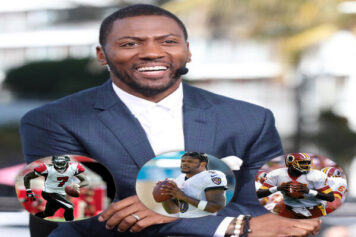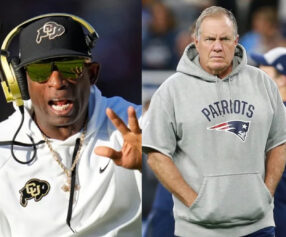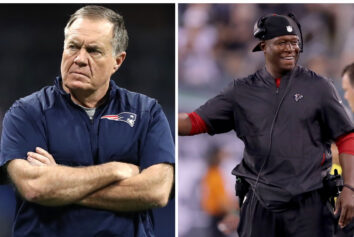Ahead of the release of his new book “The 2% Way” on Monday, neurosurgeon, Rhodes Scholar and former NFL safety Myron Rolle dropped by “The Pivot Podcast” to discuss the book as he shared stories from a career excelling on the field, in the classroom and eventually in a field even more exclusive than the NFL.
The dumb jock stereotype has been antiquated for quite some time, particularly when it comes to Black athletes. However, it is a stereotype that some of us have even aspired to, in our youth. And there are still many horror stories of players who attend universities with NFL dreams and no intention of actually feeding their brains. With the new NIL opportunities, we will see this dynamic more frequently.
As well as coaches at universities who discourage their top athletes from taking on real deal, time-consuming academic burdens.
Former NFL player Myron Rolle has been busting up stereotypes for a long time now.
Despite being the No. 1 ranked high school football player in the country, Rolle, of Bahamian descent, equally recognized the medical profession as a viable life option. He competed and thrived at the highest levels in college.
“It was a philosophy that my coach at Florida State, Mickey Andrews, put on all of us,” explained Rolle. “He wanted us to get two percent better at everything and grab small levels of incremental growth every day. It’s about getting better as an athlete, being a better leader on the field, and I sort of extrapolated that to life. With anything I do, I’m trying to grab two percent from that to add it to my journey and change my trajectory. … No matter who you are or where you come from, you can implement small steps to reach your larger goals.”
“You tell me to be a student-athlete, and then I go and do that at the highest level, and now it’s a black mark against me,” said Rolle. “I remember (then Tampa Bay Buccaneers head coach) Raheem Morris came up to me after the meeting, and said ‘hey, you’re a hero for my son.’ He looked out for me, but he was the only one. I knew then that this thing was going to be with me wherever I went in my NFL career.”
“I tried to remove it from my mind when I played football,” said Rolle. “I tried not to think about the damage I was taking on this gelatinous organ…I tried to suspend those thoughts, because just like you all know, if you’re a step slow, it’s over. I didn’t hamstring myself with those thoughts. As a physician, I wish I would have thought about it more back then. … My recompense for not doing it then is working with the NFL now to make the game safer and preserve the wonderful men who play this sport. NFL players have the right DNA to be leaders in this world, but if we’re cutting your time short, then we’re doing a disservice.”
“The real pivotal moment for me in my life is in the chapter where I speak profoundly about getting into a fight as a young person,” said Rolle. “When I was 10 someone called me the ‘N-word’ and my mom the ‘b word.’ … So I beat him up and he had to go to the hospital. … We ended up having to go to court and I saw there the disappointment in my mom’s eyes. I realized something then, because I was a good athlete and a good student, but I didn’t realize that my behavior had to match those aspects. … At that point I moved away from that temper and that anger. … If I had gone down that juvenile detention path, I would not be here sitting with you all.”
“What’s been important in my pivot is using what football has taught me to be a good physician,” said Rolle. “I know what the grind feels like. That’s irreplaceable. You can do that in any field. Whatever it is, you can use what your prior life has taught you, infuse that into what you’re doing now, have success and lift up other people around you.”



